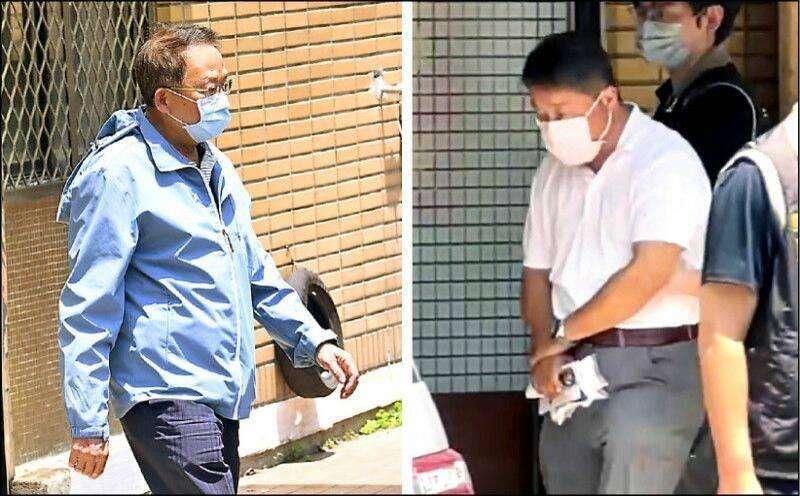The Taichung District Prosecutors’ Office today concluded its investigation into allegations of recall petition forgery at the Chinese Nationalist Party's (KMT) Taichung chapter, indicting 34 party workers.
The chapter falsified 4,258 signatures in the first stage of recall campaigns targeting DPP legislators Tsai Chi-chang (蔡其昌) and Ho Hsin-chun (何欣純), accounting for more than 70 percent of the signatures collected, prosecutors said.
KMT Taichung chapter secretary-general Chen Chien-feng (陳劍鋒) and executive director Wu Kang-lung (伍康龍) were among those indicted.

Photo: Taipei Times file
The charges against the 34 include document forgery under the Criminal Code and use of personal data by non-governmental entities in contravention of the Personal Data Protection Act (個人資料保護法).
Chen, Wu and two others were also charged with illegal use of personal data to forge or impersonate petitioners, in contravention of the Civil Servants Election and Recall Act (公職人員選舉罷免法).
Chen and Wu have also been accused of deleting chat records to destroy evidence.
They initially denied the allegations during the investigation, but both confessed after being detained, prosecutors said, adding that they would still ask the court impose heavy penalties to set an example.
Wu served as the overall coordinator of the recall effort, proposing the idea of copying personal information from KMT membership lists to forge recall petition forms, while Chen assisted and facilitated the operation, prosecutors said.
Workers pulled KMT membership lists for Taichung’s Central (中區) and Xitun (西屯) districts from the database and selected names to use on recall petition forms, but were instructed to avoid using those belonging to people over the age of 80 or names with simplified Chinese characters, prosecutors said.
Wu then directed party workers to alternate between blue and black pens, mix their writing styles and date the forms Feb. 1 or 2 to fall within the legal requirements, they said.
Prosecutors searched the Taichung chapter on May 2, and arrested Chen and Wu, who have been held incommunicado since.
Of those involved, 28 acknowledged all wrongdoing, cooperated with the investigation and assisted in identifying forged petition entries, prosecutors said.
They also worked under instruction and were pressured by Wu and Chen, so if they plead guilty in court, prosecutors might recommend more lenient sentences, such as probation, they said.
In the Tsai recall campaign, 2,360 signatures were collected, including supplementary petitions submitted on March 11, exceeding the required threshold of 2,235, the Taichung Election Commission found.
Only 640 signatures were verified as genuine and 1,720 were forged, meaning 72.88 percent were falsified, prosecutors said.
As for the Ho recall campaign, 3,513 signatures were collected, above the required threshold of 3,297, but only 975 were verified as genuine, and 2,538, or 72.25 percent, were found to be falsified, they said.
The forgeries led to the wrongful approval of recall proposals that would have otherwise fallen short of the legal threshold required to pass the first stage, prosecutors said.
Additional reporting by CNA

Taiwanese can file complaints with the Tourism Administration to report travel agencies if their activities caused termination of a person’s citizenship, Mainland Affairs Council Minister Chiu Chui-cheng (邱垂正) said yesterday, after a podcaster highlighted a case in which a person’s citizenship was canceled for receiving a single-use Chinese passport to enter Russia. The council is aware of incidents in which people who signed up through Chinese travel agencies for tours of Russia were told they could obtain Russian visas and fast-track border clearance, Chiu told reporters on the sidelines of an event in Taipei. However, the travel agencies actually applied

New measures aimed at making Taiwan more attractive to foreign professionals came into effect this month, the National Development Council said yesterday. Among the changes, international students at Taiwanese universities would be able to work in Taiwan without a work permit in the two years after they graduate, explainer materials provided by the council said. In addition, foreign nationals who graduated from one of the world’s top 200 universities within the past five years can also apply for a two-year open work permit. Previously, those graduates would have needed to apply for a work permit using point-based criteria or have a Taiwanese company

The Shilin District Prosecutors’ Office yesterday indicted two Taiwanese and issued a wanted notice for Pete Liu (劉作虎), founder of Shenzhen-based smartphone manufacturer OnePlus Technology Co (萬普拉斯科技), for allegedly contravening the Act Governing Relations Between the People of the Taiwan Area and the Mainland Area (臺灣地區與大陸地區人民關係條例) by poaching 70 engineers in Taiwan. Liu allegedly traveled to Taiwan at the end of 2014 and met with a Taiwanese man surnamed Lin (林) to discuss establishing a mobile software research and development (R&D) team in Taiwan, prosecutors said. Without approval from the government, Lin, following Liu’s instructions, recruited more than 70 software

Taiwanese singer Jay Chou (周杰倫) plans to take to the courts of the Australian Open for the first time as a competitor in the high-stakes 1 Point Slam. The Australian Open yesterday afternoon announced the news on its official Instagram account, welcoming Chou — who celebrates his 47th birthday on Sunday — to the star-studded lineup of the tournament’s signature warm-up event. “From being the King of Mandarin Pop filling stadiums with his music to being Kato from The Green Hornet and now shifting focus to being a dedicated tennis player — welcome @jaychou to the 1 Point Slam and #AusOpen,” the